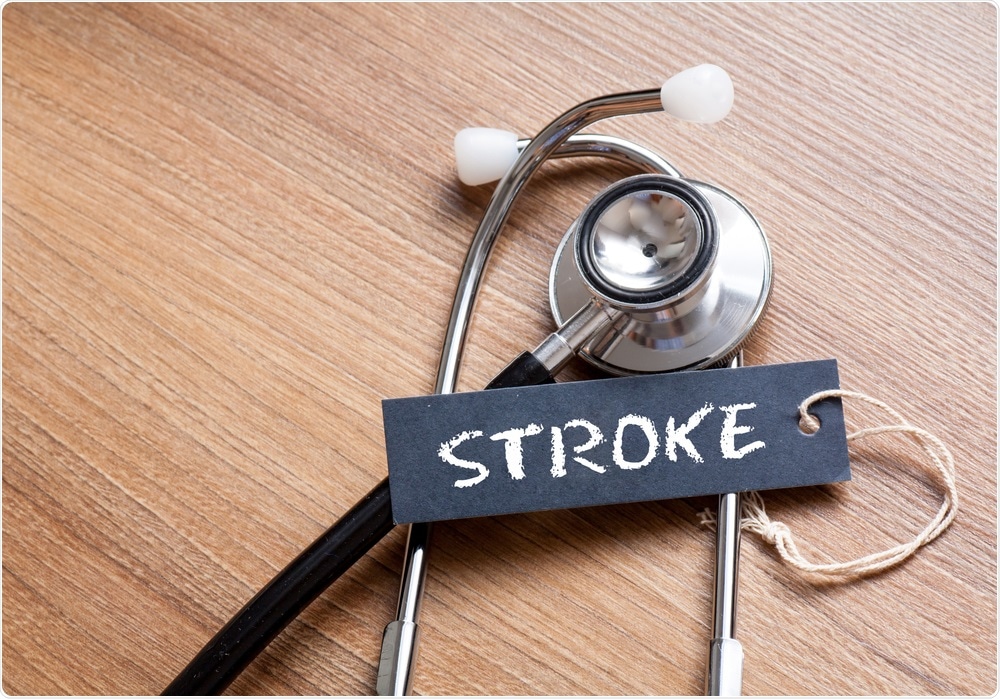A research team from Geisinger Health System has detected a common genetic variant as a risk factor for stroke, particularly in patients aged more than 65.

Stroke Concept. Image Credit: Lemau Studio/Shutterstock.com
Cerebral small vessel disease (SVD) is a medical condition that causes around a quarter of ischemic strokes across the world and is the leading cause of vascular dementia. This disease can occur as lesions on the brain, and they are usually seen on brain scan images. SVD is generally linked to hypertension and aging; however, a few cases are induced by cysteine modifying variants in the NOTCH3 gene.
This kind of gene variant is found in nearly 1 in 300 individuals. Cerebral autosomal dominant arteriopathy with subcortical infarcts and leukoencephalopathy, or CADASIL for short, is a rare hereditary condition caused by the NOTCH3 gene variant. This condition has been linked to SVD and a greater risk of stroke.
In the new study, published in the Stroke journal, the team assessed a set of health records, such as imaging and genomic sequencing data, of over 300 patients from Geisinger Health System. Among these patients, 118 displayed a NOTCH3 variant. And among this group, 12.6% had a history of stroke when compared to 4.9% of those in a control group.
The stroke risk was considerably higher in individuals older than 65, and these patients had a relatively higher number of white matter lesions on their brains. While all the 118 patients in the study group exhibited a NOTCH3 genetic variant, the particular variant that is responsible for causing CADASIL was scarcely observed.
Considering the high population frequency of the NOTCH3 genetic variants, the number of patients who may have a greater risk of stroke and SVD due to a NOTCH3 genetic variant is crucial. According to the study, the majority of the people with a NOTCH3 genetic variant will develop NOTCH3-related SVD after the age of 65.
Stroke is a complex multifactorial condition. Dissecting its risk factors and identifying ways to improve patient outcomes is a crucial part of improving patient care.”
Vida Abedi, PhD, Study Co-Author and Scientist, Department of Molecular and Functional Genomics, Geisinger Health System
“This study represents a novel and powerful approach to studying the genetic basis of neurologic disease. Geisinger’s unique resources, its electronic health records and focus on precision medicine allows us to leverage this data to provide better care for all of our patients,” Ramin Zand concluded.
Ramin Zand is also a vascular neurologist and clinician-scientist at Geisinger Health System and the co-author of the study.
To identify stroke signs, individuals should remember the acronym “BE FAST”:
- Balance: Does the person show signs of immediate loss of balance?
- Eyes: Are they experiencing sudden vision trouble like blurred, double, or loss of vision?
- Face: Does the person’s face look uneven when they’re asked to smile?
- Arms: Is there a weakness in one or both arms?
- Speech: Does the person have a problem speaking or seem confused?
- Time: Call 9-1-1 if people observe any of these signs or symptoms.
Source:
Journal reference:
Kalaria, R, N & Kittner, S, J (2020) Top-NOTCH3 Variants in the Population at Large. Stroke: Journal of the American Heart Association. doi.org/10.1161/STROKEAHA.120.031609.